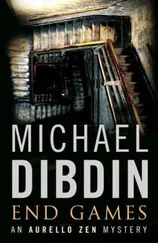Michael Dibdin - Vendetta
Здесь есть возможность читать онлайн «Michael Dibdin - Vendetta» весь текст электронной книги совершенно бесплатно (целиком полную версию без сокращений). В некоторых случаях можно слушать аудио, скачать через торрент в формате fb2 и присутствует краткое содержание. Жанр: Полицейский детектив, на английском языке. Описание произведения, (предисловие) а так же отзывы посетителей доступны на портале библиотеки ЛибКат.
- Название:Vendetta
- Автор:
- Жанр:
- Год:неизвестен
- ISBN:нет данных
- Рейтинг книги:4 / 5. Голосов: 1
-
Избранное:Добавить в избранное
- Отзывы:
-
Ваша оценка:
- 80
- 1
- 2
- 3
- 4
- 5
Vendetta: краткое содержание, описание и аннотация
Предлагаем к чтению аннотацию, описание, краткое содержание или предисловие (зависит от того, что написал сам автор книги «Vendetta»). Если вы не нашли необходимую информацию о книге — напишите в комментариях, мы постараемся отыскать её.
Vendetta — читать онлайн бесплатно полную книгу (весь текст) целиком
Ниже представлен текст книги, разбитый по страницам. Система сохранения места последней прочитанной страницы, позволяет с удобством читать онлайн бесплатно книгу «Vendetta», без необходимости каждый раз заново искать на чём Вы остановились. Поставьте закладку, и сможете в любой момент перейти на страницу, на которой закончили чтение.
Интервал:
Закладка:
At some point in this timeless torment he found himself confronted by a new obstacle, unforeseen by the rules of the game which had absorbed him hitherto. It was a wiremesh fence, about four metres high, supported on concrete stakes and stretching away in either direction as far as the eye could see. Some distance behind it stood a similar fence of barbed wire.
Zen's first thought was that it was some sort of military installation. It wasn't until he saw a sign reading 'Beware of the Lions' that he realized he had blundered into the perimeter fence of the Villa Burolo. He started to follow the fence as it marched up the hillside. But where it cut effortlessly through the undergrowth, dividing the wilderness in two with surrealistic precision, Zen had to scramble, wriggle, dodge and feint. Denser thickets in his path constantly forced him to seek alternative routes, and as he became more exhausted he began to lose his footing on the steep slope. His hands were soon scuffed and scratched, his clothing tattered, his legs bruised and bleeding.
It was some time before it occurred to him that he might try to attract attention by setting off the villa's alarm systems. If he could set the sirens off, the caretaker might turn on the closed-circuit television scanners, see the armed figure of Spadola and phone the police. The problem was that in order to minimize false alarms, the outer fence was not connected to the system, so Zen had to lob stones at the inner fence with its attached sensors. This consisted of single strands of razor wire, and was very hard to hit. Zen's aim gradually improved, but before any of the stones connected with the target something that sounded like a swarm of bees whined past his head. An instant later he heard the gunshot.
When he turned round, Spadola had already broken open the shotgun and was reloading the spent barrel. He gestured angrily at Zen, waving him away from the fence.
This incident served to remind Zen of the realities of his situation. The noise the shot made passing overhead suggested it had been travelling fast enough to do significant damage to his hands, face and neck. At the very least such injuries would cause serious loss of blood, in turn inducing a shocked condition in which further resistance would become impossible. Spadola could do that any time he wanted to. The fact that he had deliberately aimed high proved that. He was in total command of the situation, and would carry out the killing when it suited him and not before. Meanwhile, Zen could only struggle like a animal being used for scientific research, its agony the subject of dispassionate study, its feeble attempts to escape as predictable as they are vain.
At length the fence, obeying the forgotten whims of a dead man, changed direction to run north across the mountainside. Zen had now to choose between following it into unknown territory or continuing up the face of the mountain towards the lurid green forest massed at the head of the valley now closed by the dam. And he had to choose quickly, because Spadola was suddenly forcing the pace. But as soon as he saw that his quarry was continuin8 to struggle up into ever higher and wilder regions, he fell back again. What had conerned him, presumably, was that Zen might try to circle round the Burolo property to the main road. If he asked himself why his victim had selected the harder and more hopeless option, he probably put it down to his growing confusion and disorientation.
Zen toiled up the successive ridges of the mountainside towards the forest. By now the contrast between the hysterical green of the conifers and the sombre tones of the parched, abstemious landscape was less evident than it had been from a distance. Close to, it was not the upper surface of the forest that struck the eye but its lower depths, a dull brown stagnancy killed off by the tall victors of the struggle for survival. Their outspread branches formed a roof which closed off all light to the ground, condemning their own lower branches together with the losers of the race, whose spindly skeletons rose from a mulch of pine needles and rotting branches. This was what Zen had been hoping for. Vasco Spadola thought that he could play cat and mouse with his victim for hours yet, spinning out the game until the approach of night.
What he hadn't realized was that in that unnatural forest, beneath those trees gorged on water seeping from the flawed dam, it was always night.
Zen glanced back to find that Spadola had broken into a run. Teeth gritted against the stabbing pain in his ankle, Zen ran too. He ran with the desperation of a man who knows that his life depends on it, and for the first crucial moments, despite his injury, he ran faster. After that Spadola rapidly started to narrow the gap, but by then it was too late. Zen had reached the cover of the trees.
Another shot rang out, and Zen felt stinging pains all over his arms, legs and back. When he clapped a hand to his neck, as though slapping a mosquito, it came away stained with blood. Then he saw the lead pellets in his hand, little black lumps lodged just under the skin like burrowing ticks.
As Zen made his way deeper into the forest, he knew that there would be no further reprieves. The sadistic pleasure of killing his enemy by degrees had been replaced in Spadola's mind by an urgent desire to finish him off before it was too late.
After so many hours in the open, entering the forest was like stepping into a huge building: hushed, mysterious, dim and intimate in detail, vast and complex in design.
Zen barged on, forcing aside the brittle tendrils that waved outwards from the trunks, like seaweed under water.
Qnce his eyes had adjusted, the darkness thinned to a dimness that limited visibility to about ten metres, except when a clearing caused by a rocky outcrop punched a hole in the dense fabric of the forest. In one of these, he suddenly caught sight of a great curtain of concrete, towering above the trees. The thought of that hanging lake increased his impression of being under water. Beyond the immediate circle of bare column-like tree trunks, nothing was visible. Despite the moisture that forced its way out through the faults in the dam to keep the undersoil perpetually damp, nothing grew beneath the killing cover of the trees. The forest was a reservoir of silence and darkness. No breezes entered, nothing stirred.
The bare soil, soft with composted droppings, squelched underfoot. It was that sound which could give him away, he realized. In the deathly hush beneath the trees, the least noise would betray his position, and it was impossible to move without making a noise. But by the same token, Spadola could only hear Zen if he himself stopped moving, in which case he would fall ever further behind, the sounds would grow fainter and his bearings on their source less precise. So Zen's strategy was to plough or. without once stopping or looking back, and then, once he was deep inside the forest, to stop and stay absolutely still. Then the tables would be turned. Deprived of any clue as to Zen's whereabouts, Spadola could only beat about a random, while the noise he made doing so would give Zen ample warning of his approach. If necessary, Zen could simply repeat the process until darkness fell. The advantage now lay with him.
The Aoor of the forest sloped gently to the east, following the contours of the invisible mountainside. Zen pushed on, his arms held up to protect his face from the dead twigs sticking out from the tree trunks. Several times he tripped agonizingly. Once he stumbled on a root surfacing like a monstrous worm and fell against a broken branch that cut his forehead open. But he felt nothing until he stopped, satisfied that he had gone far enough. Then all the injuries he had suffered ganged up to air their grievances. Surrendering to his exhaustion, Zen stretched out on the ground and closed his eyes.
Читать дальшеИнтервал:
Закладка:
Похожие книги на «Vendetta»
Представляем Вашему вниманию похожие книги на «Vendetta» списком для выбора. Мы отобрали схожую по названию и смыслу литературу в надежде предоставить читателям больше вариантов отыскать новые, интересные, ещё непрочитанные произведения.
Обсуждение, отзывы о книге «Vendetta» и просто собственные мнения читателей. Оставьте ваши комментарии, напишите, что Вы думаете о произведении, его смысле или главных героях. Укажите что конкретно понравилось, а что нет, и почему Вы так считаете.












